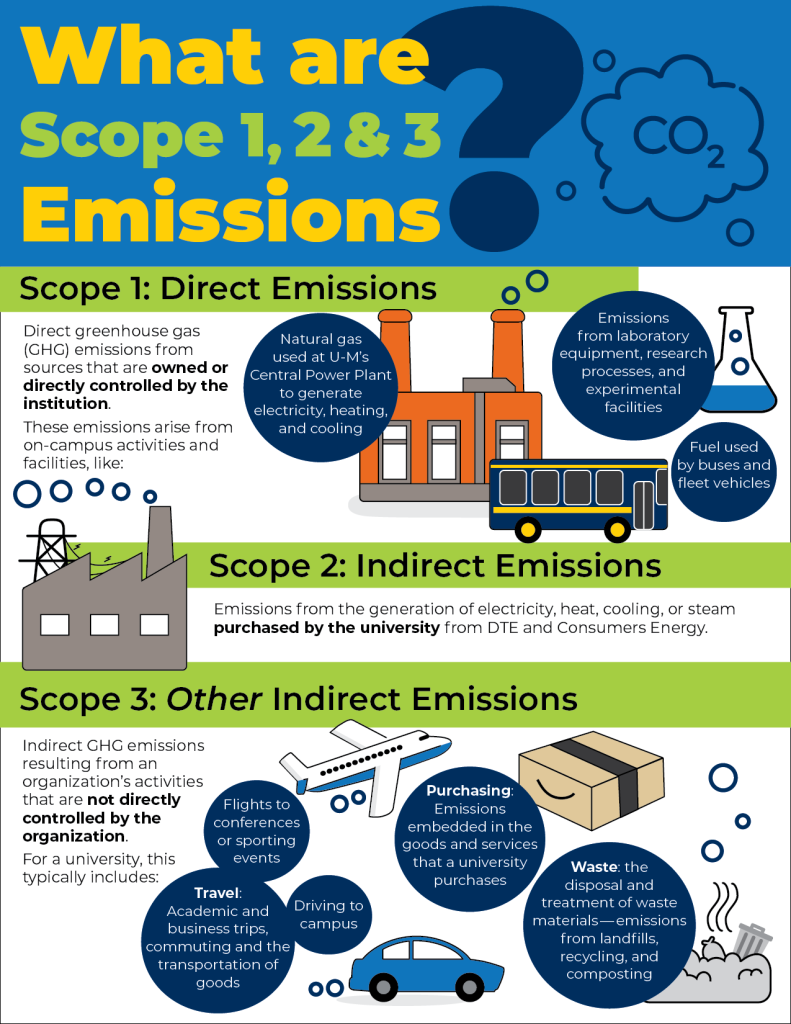Analysis and Planning Project
The Scope 3 Emissions Analysis and Planning Project assessed U-M’s Scope 3 data and identified strategies to mitigate indirect emissions campus-wide.
In partnership with Buro Happold Consulting from mid-2024 through February 2025, this project analyzed how to improve the quality of our Scope 3 data, developed a system to track Scope 3 emissions, developed an understanding of the community’s priorities, and recommended strategies for Scope 3 management and impact.
Building on Past Efforts
This effort stems from the university’s commitment to establish goals for a wide range of Scope 3 greenhouse gas (GHG) emissions by 2025.
It builds on past efforts to quantify U-M’s Scope 3 emissions and identify how to mitigate them, including:
- President’s Commission on Carbon Neutrality (PCCN) Internal Analysis Team reports:
- Scope 3 Purchased Goods and Services Footprinting
- Michigan Athletics Scope 3 Analysis
Project Team and Leadership
Sponsor: Shana Weber, Associate Vice President for Campus Sustainability
Project Manager: Katrina Folsom, Office of Campus Sustainability
Project Team:
Anya Dale, Office of Campus Sustainability Sustainable Systems & Waste Manager
Ken Keeler, Office of Campus Sustainability Sr Sustainability Representative
Amanda Jarson, Project Coordinator
Advisory Council:
Janet Abbruzzese, U-M Health Chief Supply Chain Officer
Chip Amoe, U-M Health Sustainability Officer
Andy Berki, Office of Campus Sustainability Director
Alex Bryan, Student Life Director of Sustainability
Tony Denton, U-M Health, Senior VP and Chief ESG Officer
Alicia Echeveste, Student Representative, SEAS MS
Shoshannah Lenski, Center for Sustainable Systems Associate Director
Geoff Lewis, Center for Sustainable Systems Research Specialist
Ashley Ouendag, Procurement Services Procurement Operations Manager
Tally Thrasher, AVP and Chief Procurement Officer, Procurement Services
What are Scope 3 Emissions?
Scope 3 emissions are the indirect greenhouse gas emissions resulting from a university’s activities that are not directly controlled by the university. These include emissions from purchased goods and services, university-sponsored travel, commuting, waste disposal, and others across 15 categories. Because these emissions come from diverse and indirect sources, they are often the hardest to measure and reduce.
Engagement Opportunities
Join this email list for project updates and event invitations.
Past Engagement Materials
Thanks to everyone who provided feedback during two phases of engagement in fall 2024. Here are a few highlights.
Draft Recommendations (as of 12/4/24)
Town Hall Presentation (Video)



